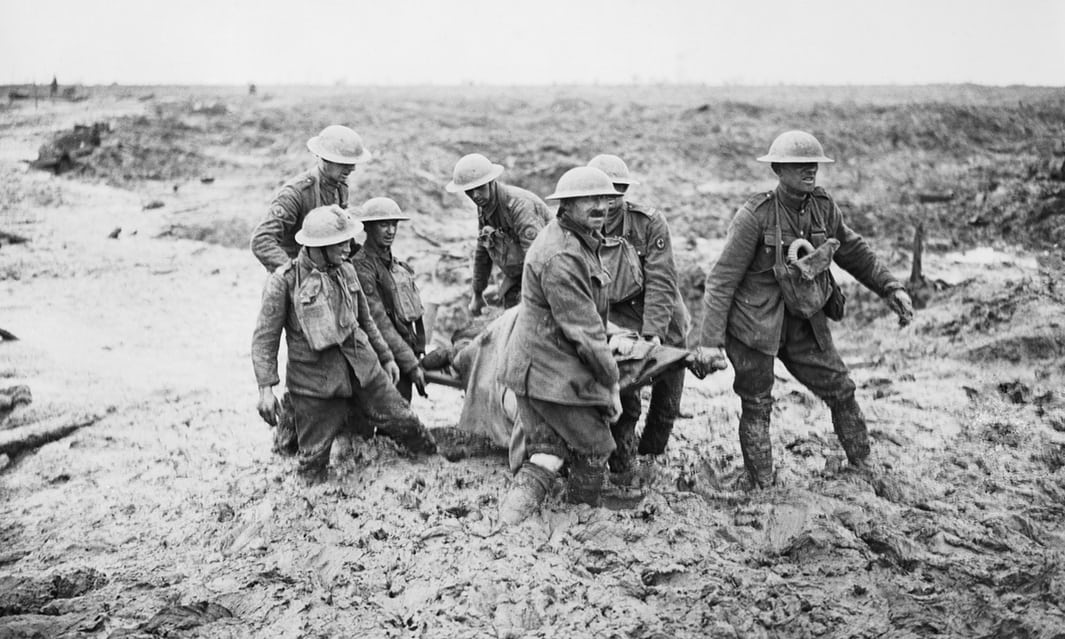Important!
Why must I live in this grim age
When, to a far horizon, God
Has ebbed away, and man, with rage
Now wields the sceptre and the rod?
Man raised his sword, once God had gone,
To slay his brother, and the roar
Of battlefields now casts upon
Our homes the shadow of the war.
The harps to which we sang are hung
On willow boughs, and their refrain
Drowned by the anguish of the young
Whose blood is mingled with the rain.
— Hedd Wyn
Translation by Alan Llwyd
© Alan Llwyd / Cyhoeddiadau Barddas
Hedd Wyn: the shepherd poet whose story shows the stupidity of war
By Giles Fraser, Thursday 9 November 2017
When the first world war broke out, the poet Ellis Humphrey Evans was working as a shepherd on the family hill farm in north Wales. Generally better known by his bardic name, Hedd Wyn, which means blessed peace in Welsh, Evans initially refused to sign up. While the Anglican establishment was calling on young men to do their duty for God and country, there were others, particularly in the Welsh nonconformist tradition, who refused this dangerous combination. “Why must I live in this grim age,” writes Evans in his poem War, “When, to a far horizon, God / Has ebbed away, and man, with rage / Now wields the sceptre and the rod.”
But when the army came for his younger brother, Evans took his place, despite his Christian pacifism – or perhaps even because of it. He joined the Royal Welsh Fusiliers. In France, trudging towards Passchendaele – a three-month battle that was concluded 100 years ago on Friday – Private Evans composed his final poem on the theme of the hero and posted it back home as an entry in the national Eisteddfod competition.
Twice in the last few months people have spoken to me movingly about Hedd Wyn. First was Paul Flynn, the veteran Labour MP for Newport West. Flynn’s father was a machine-gunner at Passchendaele. Believing all the nationalistic propaganda, he enlisted and fought through the worst of the mud and death. He survived, but was never the same again. Which is why, even at 82, Flynn still burns with righteous anger at the stupidity and pointlessness of war; and why he was so exercised when Tory MP Bill Cash foolishly described Passchendaele as “a wonderful battle” in a Commons debate earlier this year. As he was explaining to me what his father went through, Flynn reached for a copy of Hedd Wyn’s poems and started reading them out in Welsh – a language I do not understand. But the way he read was so intense, so focused, there was no mistaking the moral seriousness of what he was doing.
A few weeks later, I mentioned how moving I had found this to Rowan Williams, whom I had gone to visit in Cambridge. At the name of Hedd Wyn his eyes lit up. He took me into his study, where, on the bookshelf, he showed me an image of the great Welsh poet painted in the form of an orthodox icon. I knew very little about this poet beforehand, but it was clear this young shepherd from Trawsfynydd had profoundly touched the lives of many.
Hedd Wyn was killed on the first day of Passchendaele. “It was a nosecap shell in his stomach,” wrote a soldier, with him on Pilckem Ridge in the notorious Ypres salient. During the 100 days of the battle of Passchedaele, the allies gained just five miles of ground. For this they lost 310,000 men; the Germans 260,000.
A few weeks after Hedd Wyn’s death, the poem that he’d sent back from France – as tradition has it, submitted anonymously under a pseudonym – won the coveted bard’s chair at the National Eisteddfod. The prime minister, David Lloyd George, was in attendance. As the trumpets sounded, they called on the winning poet to reveal himself. After three such attempts, the archdruid stepped forward and gave the grim news that Evans had been killed in action six weeks before. The empty chair was draped in a black sheet. To this day it is remembered as the Eisteddfod of the black chair.
I will stand in silence with my poppy during the act of remembrance. But I am always conscious that remembrance is a little too easily purloined by those who want to celebrate precisely the sort of militarism and nationalistic chauvinism that led so many young men to pointless deaths. So during the silence, I will be thinking of a peace-loving man walking the hills with his sheep and hundreds of thousands like him whose lives were needlessly taken by the failure of politicians to figure out a better way for human beings to live with their differences. And I will think of that empty black chair, a haunting symbol of the total futility of war.
Photograph of stretcher-bearers struggling in mud to carry a wounded man to safety on Pilckem Ridge, Ypres, on 1 August 1917. The day before, Hedd Wyn had been killed in this area. IWM/Getty Images.

